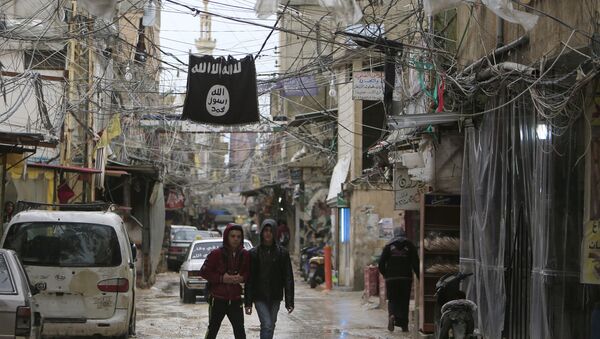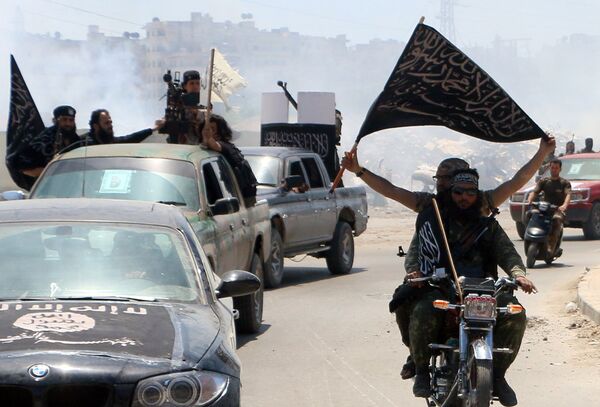The Daesh terrorist group (banned in Russia) continues to pose the highest threat to the international community, more than al-Qaeda* in the short run, but this threat is of an inspired rather than directed nature, according to team coordinator for UN Analytical Support and Sanctions Monitoring concerning Daesh**, al-Qaeda, (both banned in Russia) and Taliban Edmund Fitton-Brown.
Sputnik: What is your assessment of the current threat coming from al-Qaeda? How strong are they in Yemen at the moment? Are there any ties between al-Qaeda and Daesh?
Edmund Fitton-Brown: I think al-Qaeda is somewhat vindicated by the way that Daesh has been so severely hit over the last few years. The al-Qaeda calculation was always that Daesh represented a reckless project for which the time was not right, and I guess they feel that their analysis has been vindicated by what happened first in Iraq and then Syria. Al-Qaeda played a very different way, they've managed to keep their leadership largely alive, although they also suffered some attrition from counterterrorist operations. They also, long before Daesh, they gave a lot of authority to their affiliates to do things in their own way. It's not a very controlling leadership, central leadership from al-Qaeda. Perhaps the most interesting place where this is manifested is in West Africa, where there is the coalition called Jama'a Nusrat ul-Islam wa al-Muslimin' (JNIM) (Group to Support Islam and Muslims).
JNIM is associated with al-Qaeda in the Islamic Maghreb [AQIM, a terrorist organisation banned in Russia], it's sort of an al-Qaeda affiliate effectively, but it was formed by joining up with a number of other regional groups in the Sahel. What's been interesting about the evolution of JNIM is that they've been de-conflicting and occasionally even cooperating with Daesh in the greater Sahara in Mali and in Niger, and they have also been de-conflicting and working with a local terrorist group in Burkina Faso. So, I think what's happening, interestingly, is that because of al-Qaeda’s more tolerant approach to the local dynamics wherever they are found, I think that has given a sort of flexibility and resilience, which in Mali, in the Sahel and in West Africa has actually very troubling incidents. It’s very worrying that the groups are not fighting each other, they are working together to destabilise the local jurisdictions.
Whereas you mentioned Yemen, interestingly in Yemen, Daesh and al-Qaeda are fighting each other. Al-Qaeda in the Arabian Peninsula is much stronger than Daesh in Yemen, and generally speaking in the fighting between the two groups al-Qaeda is getting the better of it. But they've still allowed this to consume their energies. It is more important to them to be the dominant terrorist group in the areas they have influence in Yemen rather than to project the kind of an external threat that they used to project. As you know, they lost the master bomb maker - [Ibrahim Hassan] Asiri was killed in late 2017, and so that major concern that the international community had about the threat to security to aviation emanating from al-Qaeda in Yemen, that concern has been somewhat alleviated.
Sputnik: In mid-September, Trump confirmed that Hamza bin Laden, son of Osama bin Laden, had been killed. Do you confirm his death as well? How big a blow was it for al-Qaeda?
Edmund Fitton-Brown: It's an interesting one because the details of exactly how, when, in what circumstances he was killed, I still don't know. I understand that this is something that we've heard from many state interlocutors and we were inclined to conclude that he is dead, but of course it's very important to know that before it happened. There was a period when he was very physical, very vocal, and people took it as if he was emerging as a very eloquent spokesperson for al-Qaeda, and that was about the beginning of 2018. Then he went quiet, and people said that perhaps he got quiet because he was building his credentials as an operational military leader, but of course without doing that he was killed. It's entirely possible that he went quiet because he was killed.
So, we don't know and it's hard to know what exactly the significance of this is. I personally do not believe that he was ever the designated successor of [Ayman] Zawahiri. I think he was somebody who was important to al-Qaeda, he was a very capable spokesperson, he seemed to have some independence of action and it was very striking that in some of his publications he didn't attack Daesh. It was almost as if he was preparing a pitch at some point in the future where he would sort of welcome willing members of Daesh back into the al-Qaeda fold. He obviously had confidence, he was a sort of Jihadi aristocracy in some way obviously, but I don't think that he was being lined up as Zawahiri’s successor, and so it's hard to say how significant a blow to al-Qaeda that is.
Sputnik: In your opinion, which terrorist group now has the highest threat potential, and how capable is Daesh now of committing a large-scale international terrorist attack?
Edmund Fitton-Brown: The last time that we made a sort of a formal judgment on this in our last report we said that Daesh was overwhelmingly more of a threat, much more so than al-Qaeda. There was a question of whether with this further sort of depletion and also the reported death of Baghdadi, whether this reduced their capability further. My instinct is that they are still the biggest immediate threat. In the longer term, of course it's possible that al-Qaeda could re-emerge as the bigger threat, but I think for now it's certainly Daesh still.
The threat that Daesh poses is mainly an inspired threat rather than a directed threat. Daesh had to temporarily cancel, eliminate some external operational apparatus when it knew what it was facing in Syria, they knew that they were going to lose militarily, they knew they were going to lose a lot of fighters and personnel, and they considered the external operations capability to be a luxury that they couldn't sustain in those circumstances. So they folded it into their wider security apparatus, and nevertheless, there are people out there who have external operations experience. So there are dangerous people out there, but what they don't have any longer is a resourced mechanism that is supporting the planning and direction of external operations.
By far the most significant Daesh operation in 2019 has been the Easter Sunday attacks in Sri Lanka. But Daesh's core knew nothing about those attacks before they happened. It was only after they happened that Baghdadi made an editorial change to the video that was bound to be issued and there was that audio addition to it, sort of supporting what had happened in Sri Lanka. But it’s quite clear that that happened after the news of this broke in the media, and then Daesh just can't put out a video of the leader without some reference to big things that has just happened in Sri Lanka, so they made the editorial change, but it's quite clear that there was no advance knowledge amongst the Daesh core; and then that group in Sri Lanka was locally generated, locally led, and locally funded. It did have some external connections, and members of the group had travelled, including to Syria, so it's not to say that the group had no connection with external supporters of Daesh, but fundamentally it was an inspired group. The leader of the group was somebody who was more or less self-appointed as Daesh in Sri-Lanka. It was funded by the wealthy connections of some of the group's members, and the timing and the targeting and also the acquisition of the necessary military capability, all of that was done locally by the group. So what that tells you is that for now the main threat from Daesh is an inspired threat and maybe an inspired threat with some external facilitation, but it won't be a case of the remaining Daesh leadership saying “we're going to direct this group to do that operation on the streets of that European city”. At the moment, Daesh does not have that capability, but it's still a threat because of the inspired threat. Al-Qaeda remains more cautious than Daesh, but that could change over time.
Sputnik: I also wanted to touch a bit upon the Taliban and Afghanistan. How do you expect the Taliban to behave after the US troops’ withdrawal from Afghanistan? Will the withdrawal open the possibility of Afghanistan becoming a launching pad for international terrorism again?
Edmund Fitton-Brown: Well, I think one of the reasons why the peace process, the peace initiative between the Americans and the Taliban was suspended is because the Taliban were not making credible concessions and so it reached the point where the US concluded that the Taliban wasn't serious about peace. The Americans were looking for some sign of willingness to compromise, and the Taliban just weren't providing it. So I think that tells you a lot about the dynamic as it was at the end of the summer. Now whether the Taliban have taken enough of a shock from this that they might show more flexibility in resumed talks, that's not clear to me. Of course, it is possible that they may feel that they missed an opportunity. Maybe they assumed that the Americans were so keen to leave that they could just refuse to make any compromise at all, and the Americans would leave anyway.
As it now stands, the Americans and NATO are still present, the government of Afghanistan so benefits from significantly enhanced capabilities over the recent years, and the Taliban is still a formidable insurgency, but it's not necessarily winning in the sense of being able simply to prevail by military force. What they were looking for is to win just by outlasting the will of the international community to stay. Whether that calculation is changing, I don't know, but to go to your question, a key part of what the Americans were looking for was credible assurances from the Taliban that they would suppress any future terrorist threat emanating from Afghanistan. Now the Taliban is already engaged in fighting against Daesh, so there isn't particular doubt about the Taliban's desire to suppress Daesh for a variety of reasons.
But the question was would the Taliban be willing to break with al-Qaeda? There was no evidence of that. And was there a danger that if the Taliban went fully for Afghan reconciliation, would that mean that elements of the Taliban would break away and continue to work with the terrorist groups? And some of the Taliban-aligned foreign terrorist fighters in Afghanistan, would they cease to respect any restraint and become a threat to neighbouring or more distant foreign countries? I guess the short answer to your question is that we don't know for sure, but your implied question about whether peace in Afghanistan could carry with it some risks in terms of aggressive terrorist groups, that's possible. But of course, it's also possible that peace in Afghanistan would lead to a much stronger jurisdiction and much stronger safety and security forces inside Afghanistan, and that obviously would mitigate the threat.
The Monitoring Team is subordinate to the Security Council and to the committees that deal with Daesh, al-Qaida, and the Taliban. The two main functions of the Team are providing a threat assessment report on the three groupings, and maintenance of the sanctions, as well as advising UN member states to add or remove individuals or entities from the sanctions list.
*al-Qaeda is a terrorist group banned in Russia and many other countries.
** Daesh (ISIL/ISIS/IS/Islamic State) is a terrorist organisation banned in Russia




